Analysis of Human Rights in International Legal Orders Essay
VerifiedAdded on 2023/06/07
|15
|5139
|354
Essay
AI Summary
This essay examines the significant role of international human rights in administering international legal orders, addressing the justification of these orders to the public and the parochialism objection that reflects culturally biased moral values. It discusses the importance of human rights, including the rights to education, fair trial, and freedom of religion, as enshrined in the Universal Declaration of Human Rights (UDHR) and the International Covenants on Civil and Political Rights (ICCPR) and on Economic, Social and Cultural Rights (ICESCR). The essay further explores the international legal order's objective to establish friendly relations among nations, maintain international peace and security, and uphold fundamental rights, while also addressing the challenges in enforcing international law compared to national law. It highlights the role of the United Nations in resolving disputes between states and the impact of cultural differences on the interpretation and application of human rights.
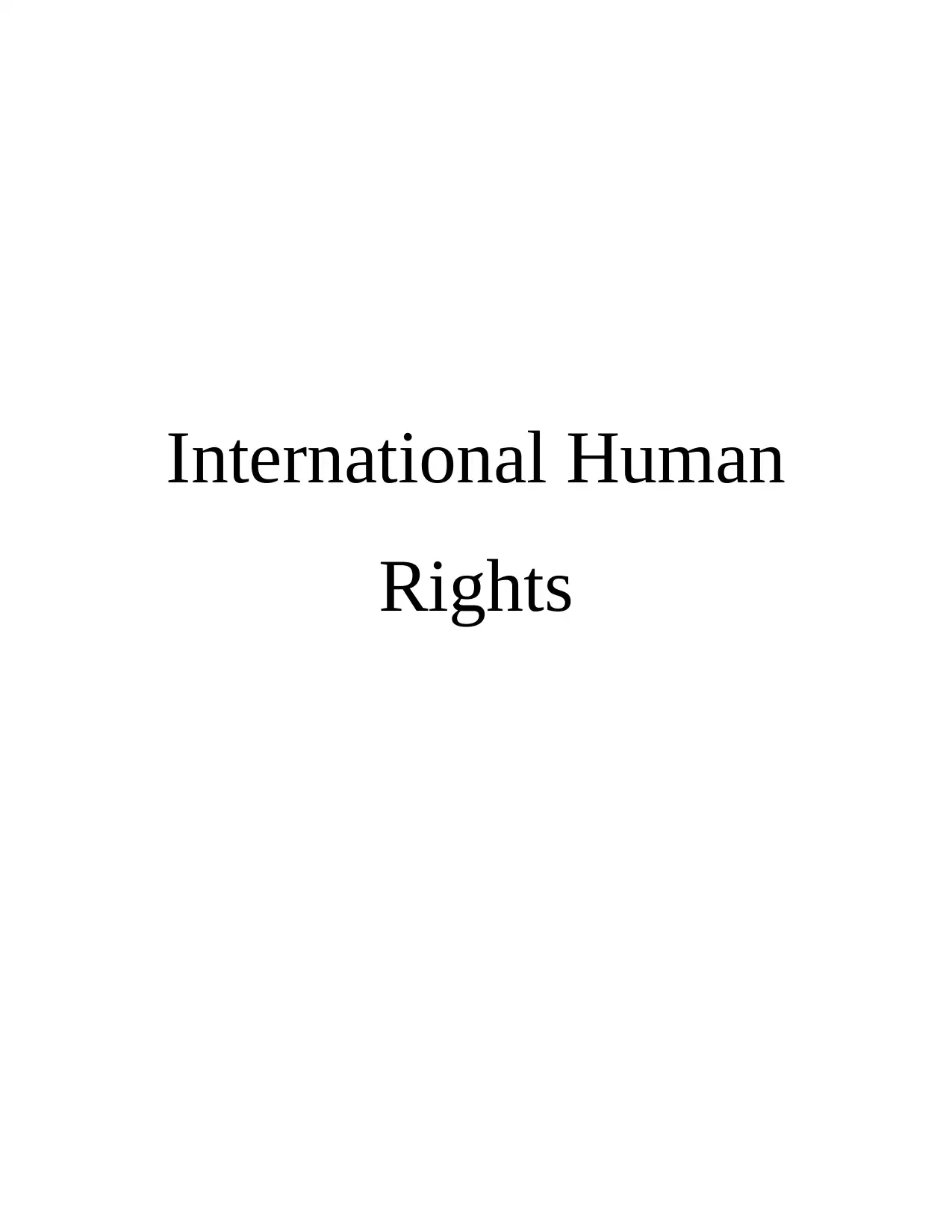
International Human
Rights
Rights
Paraphrase This Document
Need a fresh take? Get an instant paraphrase of this document with our AI Paraphraser
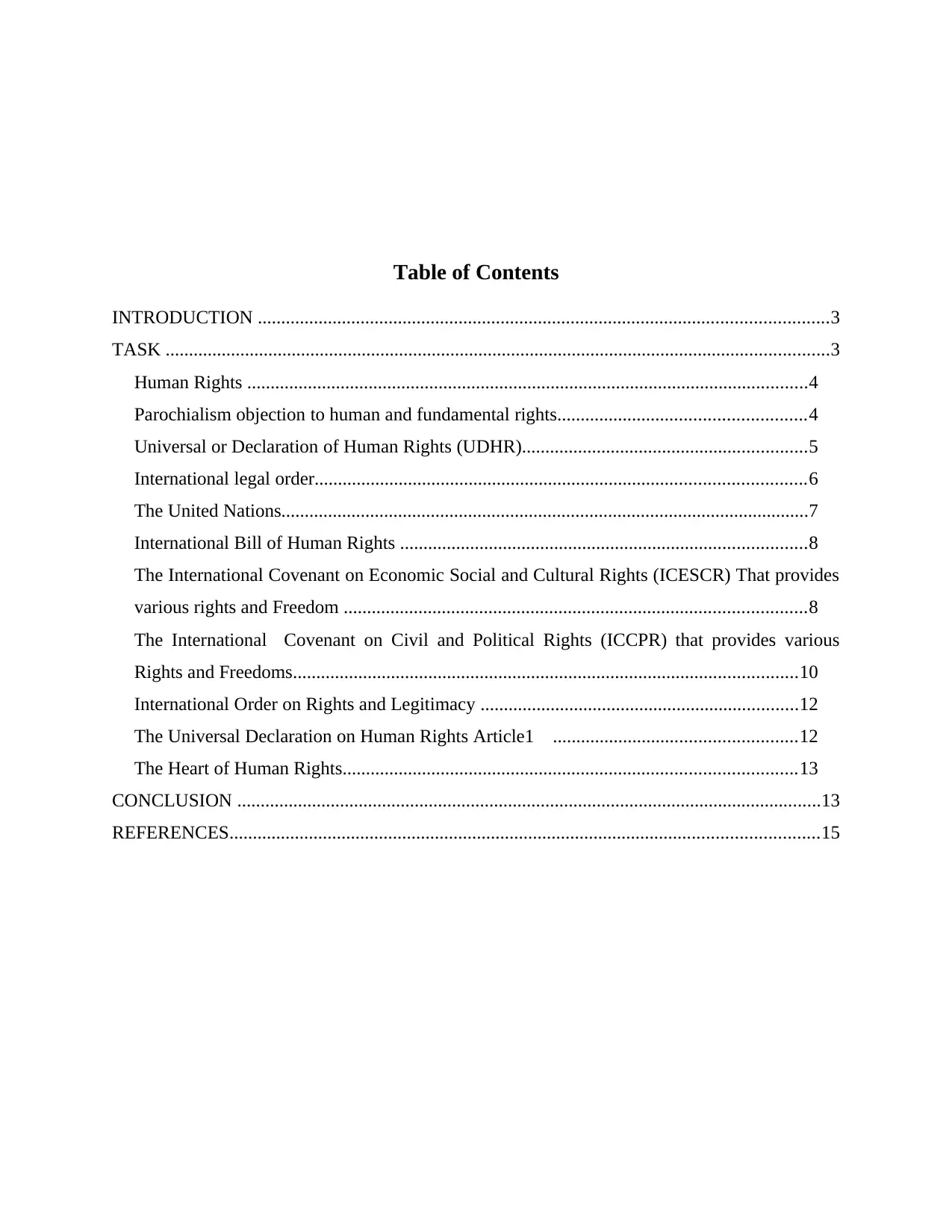
Table of Contents
INTRODUCTION ..........................................................................................................................3
TASK ..............................................................................................................................................3
Human Rights ........................................................................................................................4
Parochialism objection to human and fundamental rights.....................................................4
Universal or Declaration of Human Rights (UDHR).............................................................5
International legal order.........................................................................................................6
The United Nations.................................................................................................................7
International Bill of Human Rights .......................................................................................8
The International Covenant on Economic Social and Cultural Rights (ICESCR) That provides
various rights and Freedom ...................................................................................................8
The International Covenant on Civil and Political Rights (ICCPR) that provides various
Rights and Freedoms............................................................................................................10
International Order on Rights and Legitimacy ....................................................................12
The Universal Declaration on Human Rights Article1 ....................................................12
The Heart of Human Rights.................................................................................................13
CONCLUSION .............................................................................................................................13
REFERENCES..............................................................................................................................15
INTRODUCTION ..........................................................................................................................3
TASK ..............................................................................................................................................3
Human Rights ........................................................................................................................4
Parochialism objection to human and fundamental rights.....................................................4
Universal or Declaration of Human Rights (UDHR).............................................................5
International legal order.........................................................................................................6
The United Nations.................................................................................................................7
International Bill of Human Rights .......................................................................................8
The International Covenant on Economic Social and Cultural Rights (ICESCR) That provides
various rights and Freedom ...................................................................................................8
The International Covenant on Civil and Political Rights (ICCPR) that provides various
Rights and Freedoms............................................................................................................10
International Order on Rights and Legitimacy ....................................................................12
The Universal Declaration on Human Rights Article1 ....................................................12
The Heart of Human Rights.................................................................................................13
CONCLUSION .............................................................................................................................13
REFERENCES..............................................................................................................................15
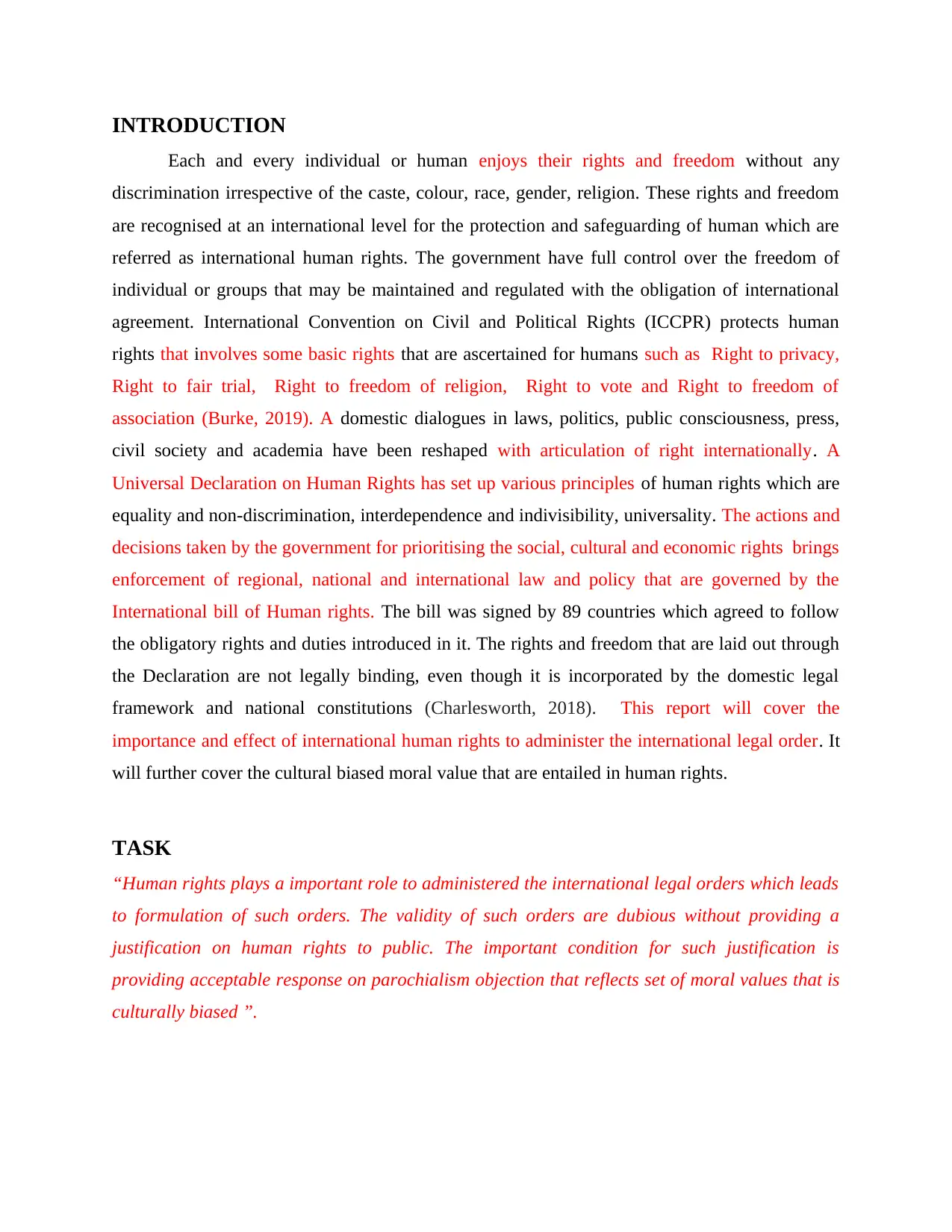
INTRODUCTION
Each and every individual or human enjoys their rights and freedom without any
discrimination irrespective of the caste, colour, race, gender, religion. These rights and freedom
are recognised at an international level for the protection and safeguarding of human which are
referred as international human rights. The government have full control over the freedom of
individual or groups that may be maintained and regulated with the obligation of international
agreement. International Convention on Civil and Political Rights (ICCPR) protects human
rights that involves some basic rights that are ascertained for humans such as Right to privacy,
Right to fair trial, Right to freedom of religion, Right to vote and Right to freedom of
association (Burke, 2019). A domestic dialogues in laws, politics, public consciousness, press,
civil society and academia have been reshaped with articulation of right internationally. A
Universal Declaration on Human Rights has set up various principles of human rights which are
equality and non-discrimination, interdependence and indivisibility, universality. The actions and
decisions taken by the government for prioritising the social, cultural and economic rights brings
enforcement of regional, national and international law and policy that are governed by the
International bill of Human rights. The bill was signed by 89 countries which agreed to follow
the obligatory rights and duties introduced in it. The rights and freedom that are laid out through
the Declaration are not legally binding, even though it is incorporated by the domestic legal
framework and national constitutions (Charlesworth, 2018). This report will cover the
importance and effect of international human rights to administer the international legal order. It
will further cover the cultural biased moral value that are entailed in human rights.
TASK
“Human rights plays a important role to administered the international legal orders which leads
to formulation of such orders. The validity of such orders are dubious without providing a
justification on human rights to public. The important condition for such justification is
providing acceptable response on parochialism objection that reflects set of moral values that is
culturally biased ”.
Each and every individual or human enjoys their rights and freedom without any
discrimination irrespective of the caste, colour, race, gender, religion. These rights and freedom
are recognised at an international level for the protection and safeguarding of human which are
referred as international human rights. The government have full control over the freedom of
individual or groups that may be maintained and regulated with the obligation of international
agreement. International Convention on Civil and Political Rights (ICCPR) protects human
rights that involves some basic rights that are ascertained for humans such as Right to privacy,
Right to fair trial, Right to freedom of religion, Right to vote and Right to freedom of
association (Burke, 2019). A domestic dialogues in laws, politics, public consciousness, press,
civil society and academia have been reshaped with articulation of right internationally. A
Universal Declaration on Human Rights has set up various principles of human rights which are
equality and non-discrimination, interdependence and indivisibility, universality. The actions and
decisions taken by the government for prioritising the social, cultural and economic rights brings
enforcement of regional, national and international law and policy that are governed by the
International bill of Human rights. The bill was signed by 89 countries which agreed to follow
the obligatory rights and duties introduced in it. The rights and freedom that are laid out through
the Declaration are not legally binding, even though it is incorporated by the domestic legal
framework and national constitutions (Charlesworth, 2018). This report will cover the
importance and effect of international human rights to administer the international legal order. It
will further cover the cultural biased moral value that are entailed in human rights.
TASK
“Human rights plays a important role to administered the international legal orders which leads
to formulation of such orders. The validity of such orders are dubious without providing a
justification on human rights to public. The important condition for such justification is
providing acceptable response on parochialism objection that reflects set of moral values that is
culturally biased ”.
⊘ This is a preview!⊘
Do you want full access?
Subscribe today to unlock all pages.

Trusted by 1+ million students worldwide
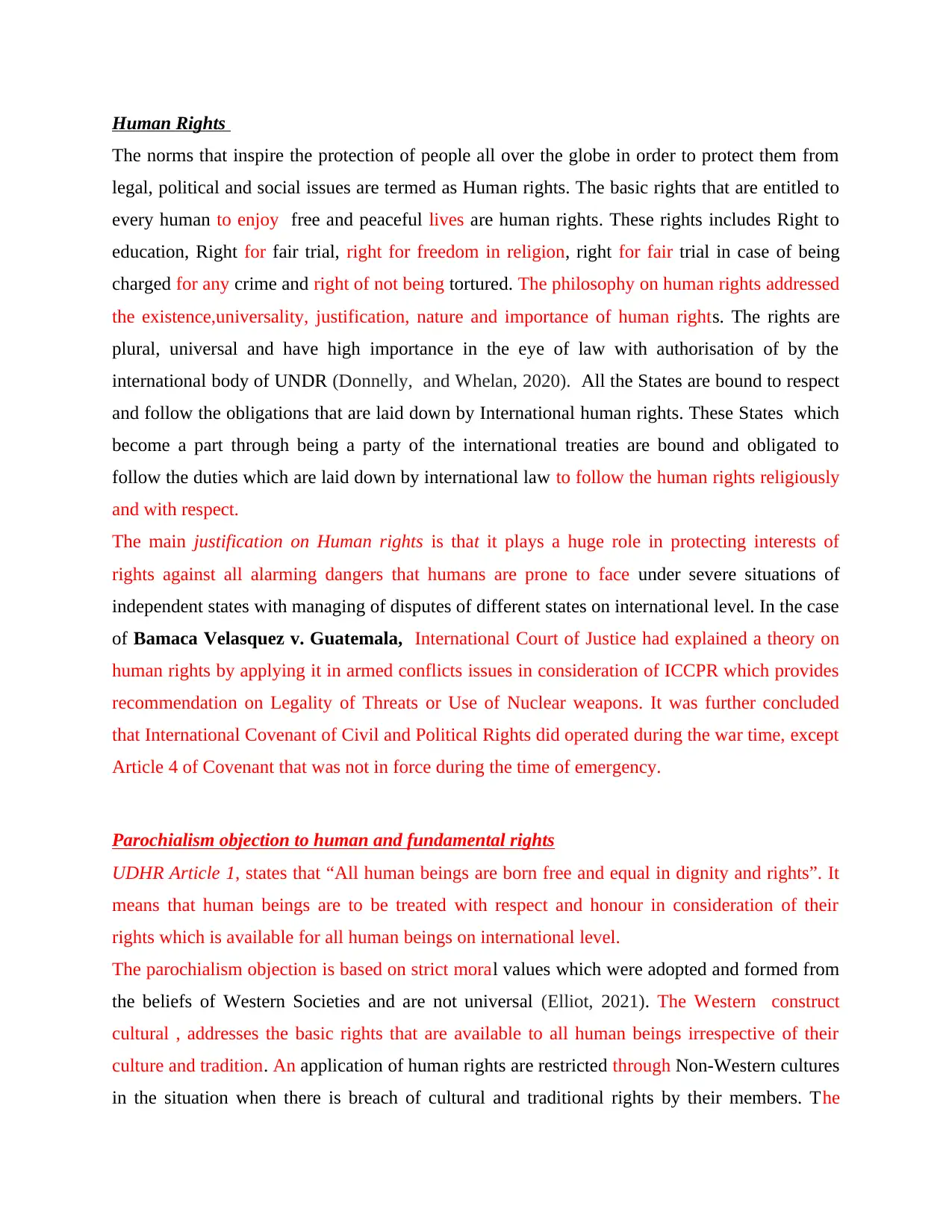
Human Rights
The norms that inspire the protection of people all over the globe in order to protect them from
legal, political and social issues are termed as Human rights. The basic rights that are entitled to
every human to enjoy free and peaceful lives are human rights. These rights includes Right to
education, Right for fair trial, right for freedom in religion, right for fair trial in case of being
charged for any crime and right of not being tortured. The philosophy on human rights addressed
the existence,universality, justification, nature and importance of human rights. The rights are
plural, universal and have high importance in the eye of law with authorisation of by the
international body of UNDR (Donnelly, and Whelan, 2020). All the States are bound to respect
and follow the obligations that are laid down by International human rights. These States which
become a part through being a party of the international treaties are bound and obligated to
follow the duties which are laid down by international law to follow the human rights religiously
and with respect.
The main justification on Human rights is that it plays a huge role in protecting interests of
rights against all alarming dangers that humans are prone to face under severe situations of
independent states with managing of disputes of different states on international level. In the case
of Bamaca Velasquez v. Guatemala, International Court of Justice had explained a theory on
human rights by applying it in armed conflicts issues in consideration of ICCPR which provides
recommendation on Legality of Threats or Use of Nuclear weapons. It was further concluded
that International Covenant of Civil and Political Rights did operated during the war time, except
Article 4 of Covenant that was not in force during the time of emergency.
Parochialism objection to human and fundamental rights
UDHR Article 1, states that “All human beings are born free and equal in dignity and rights”. It
means that human beings are to be treated with respect and honour in consideration of their
rights which is available for all human beings on international level.
The parochialism objection is based on strict moral values which were adopted and formed from
the beliefs of Western Societies and are not universal (Elliot, 2021). The Western construct
cultural , addresses the basic rights that are available to all human beings irrespective of their
culture and tradition. An application of human rights are restricted through Non-Western cultures
in the situation when there is breach of cultural and traditional rights by their members. The
The norms that inspire the protection of people all over the globe in order to protect them from
legal, political and social issues are termed as Human rights. The basic rights that are entitled to
every human to enjoy free and peaceful lives are human rights. These rights includes Right to
education, Right for fair trial, right for freedom in religion, right for fair trial in case of being
charged for any crime and right of not being tortured. The philosophy on human rights addressed
the existence,universality, justification, nature and importance of human rights. The rights are
plural, universal and have high importance in the eye of law with authorisation of by the
international body of UNDR (Donnelly, and Whelan, 2020). All the States are bound to respect
and follow the obligations that are laid down by International human rights. These States which
become a part through being a party of the international treaties are bound and obligated to
follow the duties which are laid down by international law to follow the human rights religiously
and with respect.
The main justification on Human rights is that it plays a huge role in protecting interests of
rights against all alarming dangers that humans are prone to face under severe situations of
independent states with managing of disputes of different states on international level. In the case
of Bamaca Velasquez v. Guatemala, International Court of Justice had explained a theory on
human rights by applying it in armed conflicts issues in consideration of ICCPR which provides
recommendation on Legality of Threats or Use of Nuclear weapons. It was further concluded
that International Covenant of Civil and Political Rights did operated during the war time, except
Article 4 of Covenant that was not in force during the time of emergency.
Parochialism objection to human and fundamental rights
UDHR Article 1, states that “All human beings are born free and equal in dignity and rights”. It
means that human beings are to be treated with respect and honour in consideration of their
rights which is available for all human beings on international level.
The parochialism objection is based on strict moral values which were adopted and formed from
the beliefs of Western Societies and are not universal (Elliot, 2021). The Western construct
cultural , addresses the basic rights that are available to all human beings irrespective of their
culture and tradition. An application of human rights are restricted through Non-Western cultures
in the situation when there is breach of cultural and traditional rights by their members. The
Paraphrase This Document
Need a fresh take? Get an instant paraphrase of this document with our AI Paraphraser
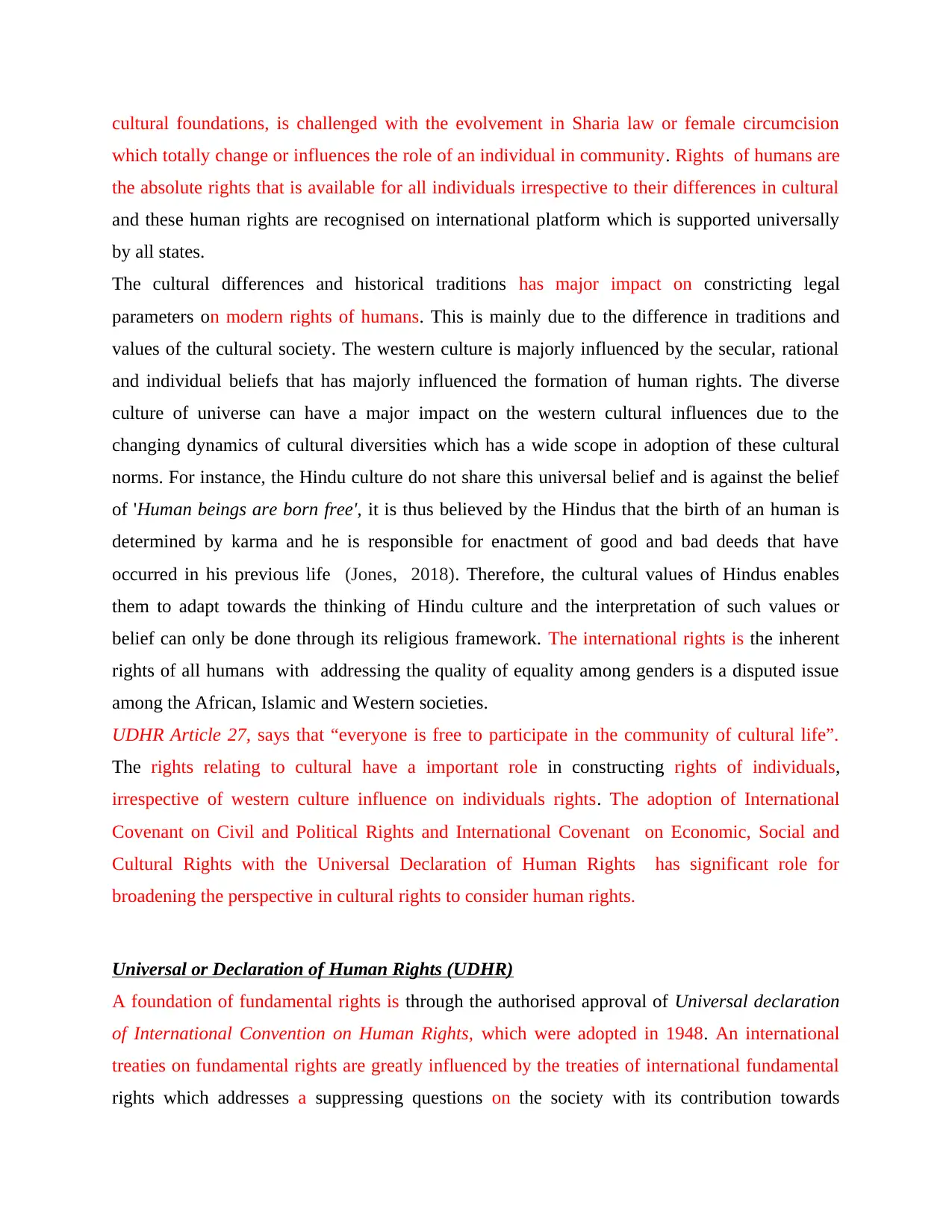
cultural foundations, is challenged with the evolvement in Sharia law or female circumcision
which totally change or influences the role of an individual in community. Rights of humans are
the absolute rights that is available for all individuals irrespective to their differences in cultural
and these human rights are recognised on international platform which is supported universally
by all states.
The cultural differences and historical traditions has major impact on constricting legal
parameters on modern rights of humans. This is mainly due to the difference in traditions and
values of the cultural society. The western culture is majorly influenced by the secular, rational
and individual beliefs that has majorly influenced the formation of human rights. The diverse
culture of universe can have a major impact on the western cultural influences due to the
changing dynamics of cultural diversities which has a wide scope in adoption of these cultural
norms. For instance, the Hindu culture do not share this universal belief and is against the belief
of 'Human beings are born free', it is thus believed by the Hindus that the birth of an human is
determined by karma and he is responsible for enactment of good and bad deeds that have
occurred in his previous life (Jones, 2018). Therefore, the cultural values of Hindus enables
them to adapt towards the thinking of Hindu culture and the interpretation of such values or
belief can only be done through its religious framework. The international rights is the inherent
rights of all humans with addressing the quality of equality among genders is a disputed issue
among the African, Islamic and Western societies.
UDHR Article 27, says that “everyone is free to participate in the community of cultural life”.
The rights relating to cultural have a important role in constructing rights of individuals,
irrespective of western culture influence on individuals rights. The adoption of International
Covenant on Civil and Political Rights and International Covenant on Economic, Social and
Cultural Rights with the Universal Declaration of Human Rights has significant role for
broadening the perspective in cultural rights to consider human rights.
Universal or Declaration of Human Rights (UDHR)
A foundation of fundamental rights is through the authorised approval of Universal declaration
of International Convention on Human Rights, which were adopted in 1948. An international
treaties on fundamental rights are greatly influenced by the treaties of international fundamental
rights which addresses a suppressing questions on the society with its contribution towards
which totally change or influences the role of an individual in community. Rights of humans are
the absolute rights that is available for all individuals irrespective to their differences in cultural
and these human rights are recognised on international platform which is supported universally
by all states.
The cultural differences and historical traditions has major impact on constricting legal
parameters on modern rights of humans. This is mainly due to the difference in traditions and
values of the cultural society. The western culture is majorly influenced by the secular, rational
and individual beliefs that has majorly influenced the formation of human rights. The diverse
culture of universe can have a major impact on the western cultural influences due to the
changing dynamics of cultural diversities which has a wide scope in adoption of these cultural
norms. For instance, the Hindu culture do not share this universal belief and is against the belief
of 'Human beings are born free', it is thus believed by the Hindus that the birth of an human is
determined by karma and he is responsible for enactment of good and bad deeds that have
occurred in his previous life (Jones, 2018). Therefore, the cultural values of Hindus enables
them to adapt towards the thinking of Hindu culture and the interpretation of such values or
belief can only be done through its religious framework. The international rights is the inherent
rights of all humans with addressing the quality of equality among genders is a disputed issue
among the African, Islamic and Western societies.
UDHR Article 27, says that “everyone is free to participate in the community of cultural life”.
The rights relating to cultural have a important role in constructing rights of individuals,
irrespective of western culture influence on individuals rights. The adoption of International
Covenant on Civil and Political Rights and International Covenant on Economic, Social and
Cultural Rights with the Universal Declaration of Human Rights has significant role for
broadening the perspective in cultural rights to consider human rights.
Universal or Declaration of Human Rights (UDHR)
A foundation of fundamental rights is through the authorised approval of Universal declaration
of International Convention on Human Rights, which were adopted in 1948. An international
treaties on fundamental rights are greatly influenced by the treaties of international fundamental
rights which addresses a suppressing questions on the society with its contribution towards
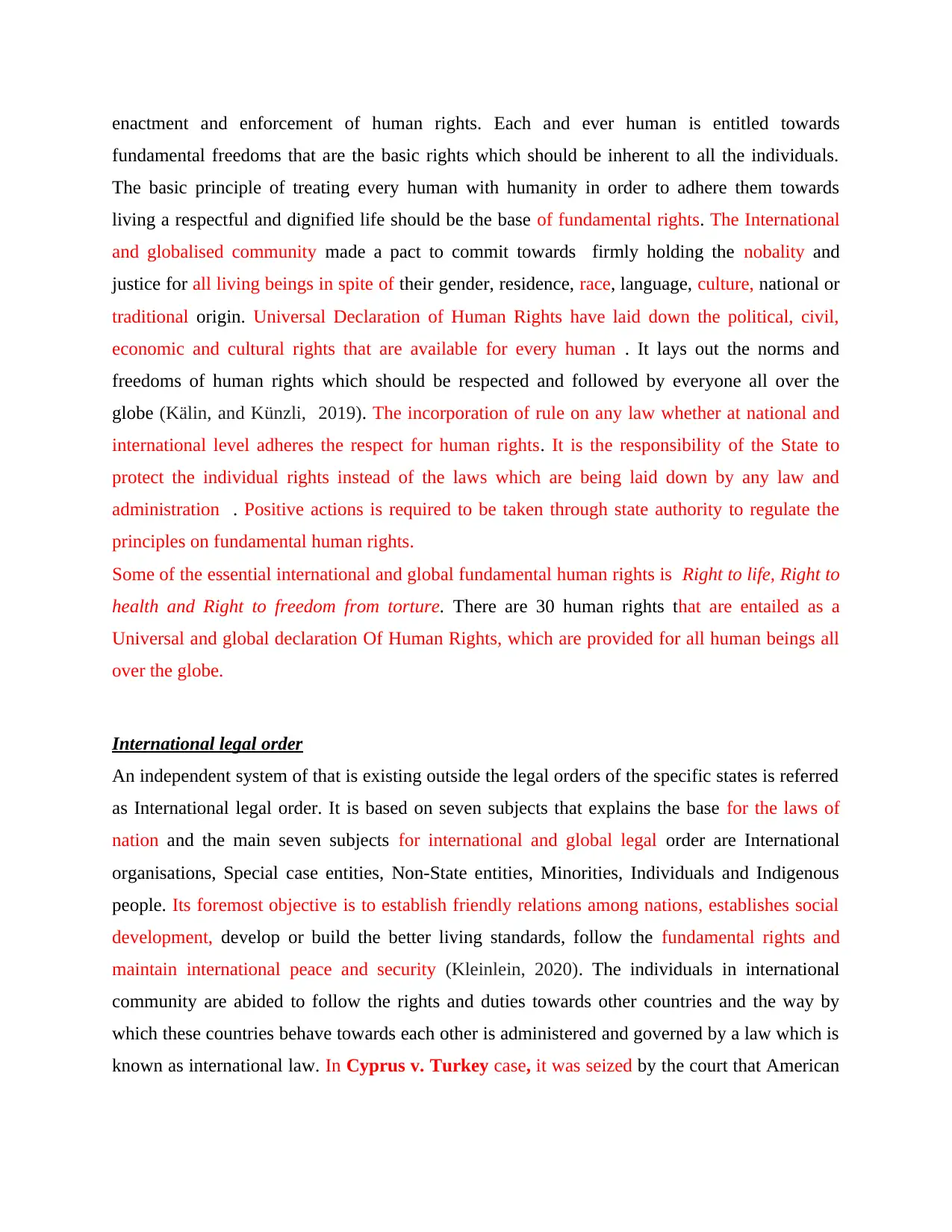
enactment and enforcement of human rights. Each and ever human is entitled towards
fundamental freedoms that are the basic rights which should be inherent to all the individuals.
The basic principle of treating every human with humanity in order to adhere them towards
living a respectful and dignified life should be the base of fundamental rights. The International
and globalised community made a pact to commit towards firmly holding the nobality and
justice for all living beings in spite of their gender, residence, race, language, culture, national or
traditional origin. Universal Declaration of Human Rights have laid down the political, civil,
economic and cultural rights that are available for every human . It lays out the norms and
freedoms of human rights which should be respected and followed by everyone all over the
globe (Kälin, and Künzli, 2019). The incorporation of rule on any law whether at national and
international level adheres the respect for human rights. It is the responsibility of the State to
protect the individual rights instead of the laws which are being laid down by any law and
administration . Positive actions is required to be taken through state authority to regulate the
principles on fundamental human rights.
Some of the essential international and global fundamental human rights is Right to life, Right to
health and Right to freedom from torture. There are 30 human rights that are entailed as a
Universal and global declaration Of Human Rights, which are provided for all human beings all
over the globe.
International legal order
An independent system of that is existing outside the legal orders of the specific states is referred
as International legal order. It is based on seven subjects that explains the base for the laws of
nation and the main seven subjects for international and global legal order are International
organisations, Special case entities, Non-State entities, Minorities, Individuals and Indigenous
people. Its foremost objective is to establish friendly relations among nations, establishes social
development, develop or build the better living standards, follow the fundamental rights and
maintain international peace and security (Kleinlein, 2020). The individuals in international
community are abided to follow the rights and duties towards other countries and the way by
which these countries behave towards each other is administered and governed by a law which is
known as international law. In Cyprus v. Turkey case, it was seized by the court that American
fundamental freedoms that are the basic rights which should be inherent to all the individuals.
The basic principle of treating every human with humanity in order to adhere them towards
living a respectful and dignified life should be the base of fundamental rights. The International
and globalised community made a pact to commit towards firmly holding the nobality and
justice for all living beings in spite of their gender, residence, race, language, culture, national or
traditional origin. Universal Declaration of Human Rights have laid down the political, civil,
economic and cultural rights that are available for every human . It lays out the norms and
freedoms of human rights which should be respected and followed by everyone all over the
globe (Kälin, and Künzli, 2019). The incorporation of rule on any law whether at national and
international level adheres the respect for human rights. It is the responsibility of the State to
protect the individual rights instead of the laws which are being laid down by any law and
administration . Positive actions is required to be taken through state authority to regulate the
principles on fundamental human rights.
Some of the essential international and global fundamental human rights is Right to life, Right to
health and Right to freedom from torture. There are 30 human rights that are entailed as a
Universal and global declaration Of Human Rights, which are provided for all human beings all
over the globe.
International legal order
An independent system of that is existing outside the legal orders of the specific states is referred
as International legal order. It is based on seven subjects that explains the base for the laws of
nation and the main seven subjects for international and global legal order are International
organisations, Special case entities, Non-State entities, Minorities, Individuals and Indigenous
people. Its foremost objective is to establish friendly relations among nations, establishes social
development, develop or build the better living standards, follow the fundamental rights and
maintain international peace and security (Kleinlein, 2020). The individuals in international
community are abided to follow the rights and duties towards other countries and the way by
which these countries behave towards each other is administered and governed by a law which is
known as international law. In Cyprus v. Turkey case, it was seized by the court that American
⊘ This is a preview!⊘
Do you want full access?
Subscribe today to unlock all pages.

Trusted by 1+ million students worldwide
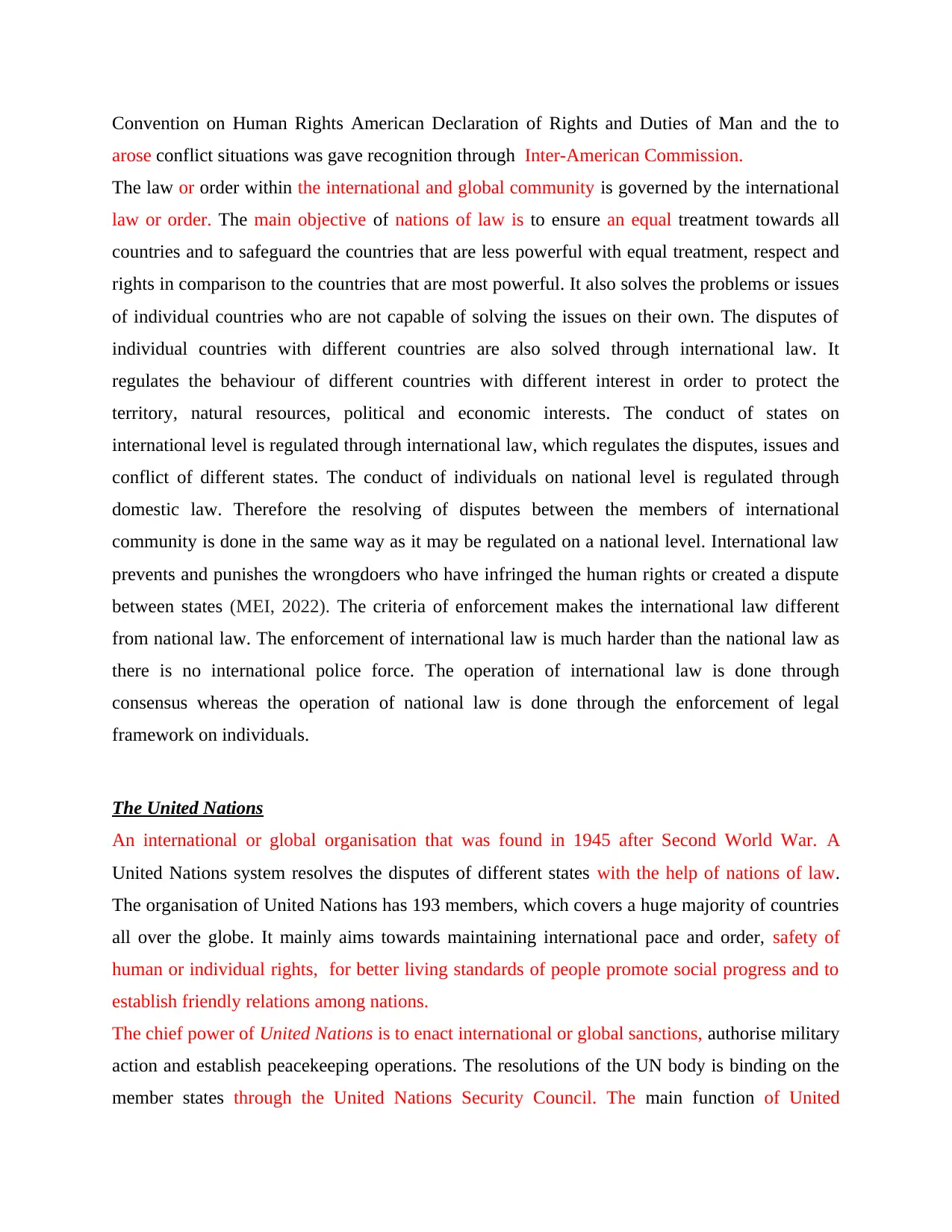
Convention on Human Rights American Declaration of Rights and Duties of Man and the to
arose conflict situations was gave recognition through Inter-American Commission.
The law or order within the international and global community is governed by the international
law or order. The main objective of nations of law is to ensure an equal treatment towards all
countries and to safeguard the countries that are less powerful with equal treatment, respect and
rights in comparison to the countries that are most powerful. It also solves the problems or issues
of individual countries who are not capable of solving the issues on their own. The disputes of
individual countries with different countries are also solved through international law. It
regulates the behaviour of different countries with different interest in order to protect the
territory, natural resources, political and economic interests. The conduct of states on
international level is regulated through international law, which regulates the disputes, issues and
conflict of different states. The conduct of individuals on national level is regulated through
domestic law. Therefore the resolving of disputes between the members of international
community is done in the same way as it may be regulated on a national level. International law
prevents and punishes the wrongdoers who have infringed the human rights or created a dispute
between states (MEI, 2022). The criteria of enforcement makes the international law different
from national law. The enforcement of international law is much harder than the national law as
there is no international police force. The operation of international law is done through
consensus whereas the operation of national law is done through the enforcement of legal
framework on individuals.
The United Nations
An international or global organisation that was found in 1945 after Second World War. A
United Nations system resolves the disputes of different states with the help of nations of law.
The organisation of United Nations has 193 members, which covers a huge majority of countries
all over the globe. It mainly aims towards maintaining international pace and order, safety of
human or individual rights, for better living standards of people promote social progress and to
establish friendly relations among nations.
The chief power of United Nations is to enact international or global sanctions, authorise military
action and establish peacekeeping operations. The resolutions of the UN body is binding on the
member states through the United Nations Security Council. The main function of United
arose conflict situations was gave recognition through Inter-American Commission.
The law or order within the international and global community is governed by the international
law or order. The main objective of nations of law is to ensure an equal treatment towards all
countries and to safeguard the countries that are less powerful with equal treatment, respect and
rights in comparison to the countries that are most powerful. It also solves the problems or issues
of individual countries who are not capable of solving the issues on their own. The disputes of
individual countries with different countries are also solved through international law. It
regulates the behaviour of different countries with different interest in order to protect the
territory, natural resources, political and economic interests. The conduct of states on
international level is regulated through international law, which regulates the disputes, issues and
conflict of different states. The conduct of individuals on national level is regulated through
domestic law. Therefore the resolving of disputes between the members of international
community is done in the same way as it may be regulated on a national level. International law
prevents and punishes the wrongdoers who have infringed the human rights or created a dispute
between states (MEI, 2022). The criteria of enforcement makes the international law different
from national law. The enforcement of international law is much harder than the national law as
there is no international police force. The operation of international law is done through
consensus whereas the operation of national law is done through the enforcement of legal
framework on individuals.
The United Nations
An international or global organisation that was found in 1945 after Second World War. A
United Nations system resolves the disputes of different states with the help of nations of law.
The organisation of United Nations has 193 members, which covers a huge majority of countries
all over the globe. It mainly aims towards maintaining international pace and order, safety of
human or individual rights, for better living standards of people promote social progress and to
establish friendly relations among nations.
The chief power of United Nations is to enact international or global sanctions, authorise military
action and establish peacekeeping operations. The resolutions of the UN body is binding on the
member states through the United Nations Security Council. The main function of United
Paraphrase This Document
Need a fresh take? Get an instant paraphrase of this document with our AI Paraphraser
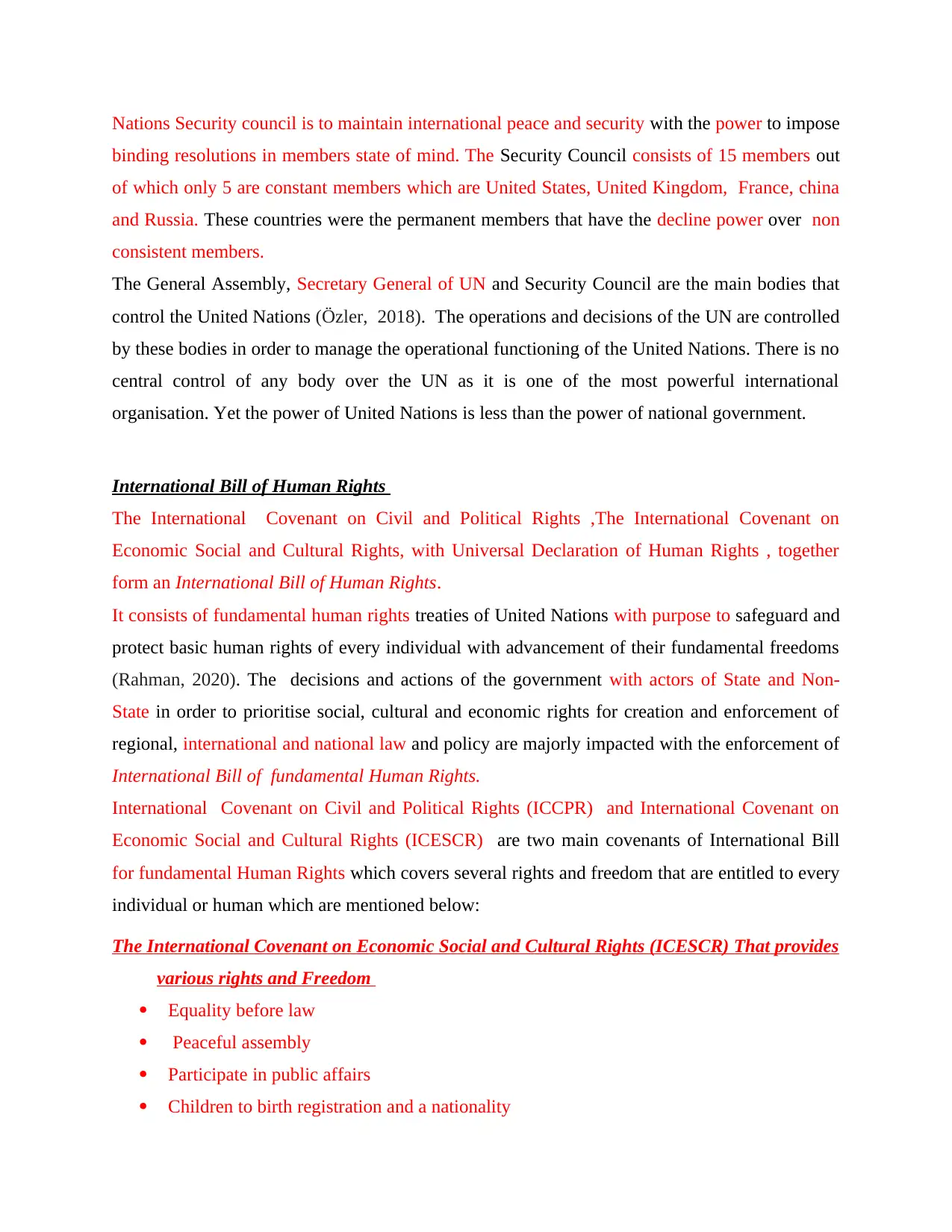
Nations Security council is to maintain international peace and security with the power to impose
binding resolutions in members state of mind. The Security Council consists of 15 members out
of which only 5 are constant members which are United States, United Kingdom, France, china
and Russia. These countries were the permanent members that have the decline power over non
consistent members.
The General Assembly, Secretary General of UN and Security Council are the main bodies that
control the United Nations (Özler, 2018). The operations and decisions of the UN are controlled
by these bodies in order to manage the operational functioning of the United Nations. There is no
central control of any body over the UN as it is one of the most powerful international
organisation. Yet the power of United Nations is less than the power of national government.
International Bill of Human Rights
The International Covenant on Civil and Political Rights ,The International Covenant on
Economic Social and Cultural Rights, with Universal Declaration of Human Rights , together
form an International Bill of Human Rights.
It consists of fundamental human rights treaties of United Nations with purpose to safeguard and
protect basic human rights of every individual with advancement of their fundamental freedoms
(Rahman, 2020). The decisions and actions of the government with actors of State and Non-
State in order to prioritise social, cultural and economic rights for creation and enforcement of
regional, international and national law and policy are majorly impacted with the enforcement of
International Bill of fundamental Human Rights.
International Covenant on Civil and Political Rights (ICCPR) and International Covenant on
Economic Social and Cultural Rights (ICESCR) are two main covenants of International Bill
for fundamental Human Rights which covers several rights and freedom that are entitled to every
individual or human which are mentioned below:
The International Covenant on Economic Social and Cultural Rights (ICESCR) That provides
various rights and Freedom
Equality before law
Peaceful assembly
Participate in public affairs
Children to birth registration and a nationality
binding resolutions in members state of mind. The Security Council consists of 15 members out
of which only 5 are constant members which are United States, United Kingdom, France, china
and Russia. These countries were the permanent members that have the decline power over non
consistent members.
The General Assembly, Secretary General of UN and Security Council are the main bodies that
control the United Nations (Özler, 2018). The operations and decisions of the UN are controlled
by these bodies in order to manage the operational functioning of the United Nations. There is no
central control of any body over the UN as it is one of the most powerful international
organisation. Yet the power of United Nations is less than the power of national government.
International Bill of Human Rights
The International Covenant on Civil and Political Rights ,The International Covenant on
Economic Social and Cultural Rights, with Universal Declaration of Human Rights , together
form an International Bill of Human Rights.
It consists of fundamental human rights treaties of United Nations with purpose to safeguard and
protect basic human rights of every individual with advancement of their fundamental freedoms
(Rahman, 2020). The decisions and actions of the government with actors of State and Non-
State in order to prioritise social, cultural and economic rights for creation and enforcement of
regional, international and national law and policy are majorly impacted with the enforcement of
International Bill of fundamental Human Rights.
International Covenant on Civil and Political Rights (ICCPR) and International Covenant on
Economic Social and Cultural Rights (ICESCR) are two main covenants of International Bill
for fundamental Human Rights which covers several rights and freedom that are entitled to every
individual or human which are mentioned below:
The International Covenant on Economic Social and Cultural Rights (ICESCR) That provides
various rights and Freedom
Equality before law
Peaceful assembly
Participate in public affairs
Children to birth registration and a nationality
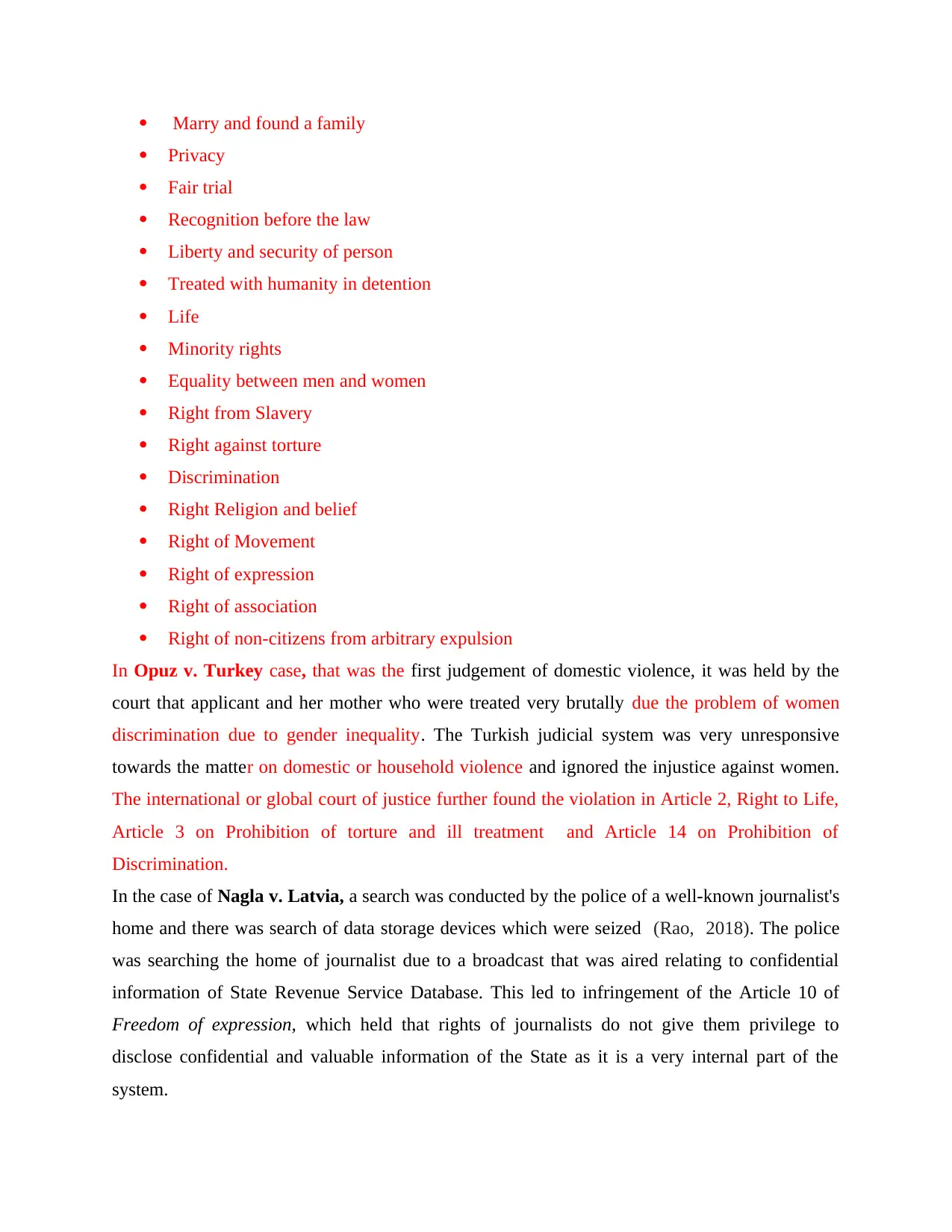
Marry and found a family
Privacy
Fair trial
Recognition before the law
Liberty and security of person
Treated with humanity in detention
Life
Minority rights
Equality between men and women
Right from Slavery
Right against torture
Discrimination
Right Religion and belief
Right of Movement
Right of expression
Right of association
Right of non-citizens from arbitrary expulsion
In Opuz v. Turkey case, that was the first judgement of domestic violence, it was held by the
court that applicant and her mother who were treated very brutally due the problem of women
discrimination due to gender inequality. The Turkish judicial system was very unresponsive
towards the matter on domestic or household violence and ignored the injustice against women.
The international or global court of justice further found the violation in Article 2, Right to Life,
Article 3 on Prohibition of torture and ill treatment and Article 14 on Prohibition of
Discrimination.
In the case of Nagla v. Latvia, a search was conducted by the police of a well-known journalist's
home and there was search of data storage devices which were seized (Rao, 2018). The police
was searching the home of journalist due to a broadcast that was aired relating to confidential
information of State Revenue Service Database. This led to infringement of the Article 10 of
Freedom of expression, which held that rights of journalists do not give them privilege to
disclose confidential and valuable information of the State as it is a very internal part of the
system.
Privacy
Fair trial
Recognition before the law
Liberty and security of person
Treated with humanity in detention
Life
Minority rights
Equality between men and women
Right from Slavery
Right against torture
Discrimination
Right Religion and belief
Right of Movement
Right of expression
Right of association
Right of non-citizens from arbitrary expulsion
In Opuz v. Turkey case, that was the first judgement of domestic violence, it was held by the
court that applicant and her mother who were treated very brutally due the problem of women
discrimination due to gender inequality. The Turkish judicial system was very unresponsive
towards the matter on domestic or household violence and ignored the injustice against women.
The international or global court of justice further found the violation in Article 2, Right to Life,
Article 3 on Prohibition of torture and ill treatment and Article 14 on Prohibition of
Discrimination.
In the case of Nagla v. Latvia, a search was conducted by the police of a well-known journalist's
home and there was search of data storage devices which were seized (Rao, 2018). The police
was searching the home of journalist due to a broadcast that was aired relating to confidential
information of State Revenue Service Database. This led to infringement of the Article 10 of
Freedom of expression, which held that rights of journalists do not give them privilege to
disclose confidential and valuable information of the State as it is a very internal part of the
system.
⊘ This is a preview!⊘
Do you want full access?
Subscribe today to unlock all pages.

Trusted by 1+ million students worldwide
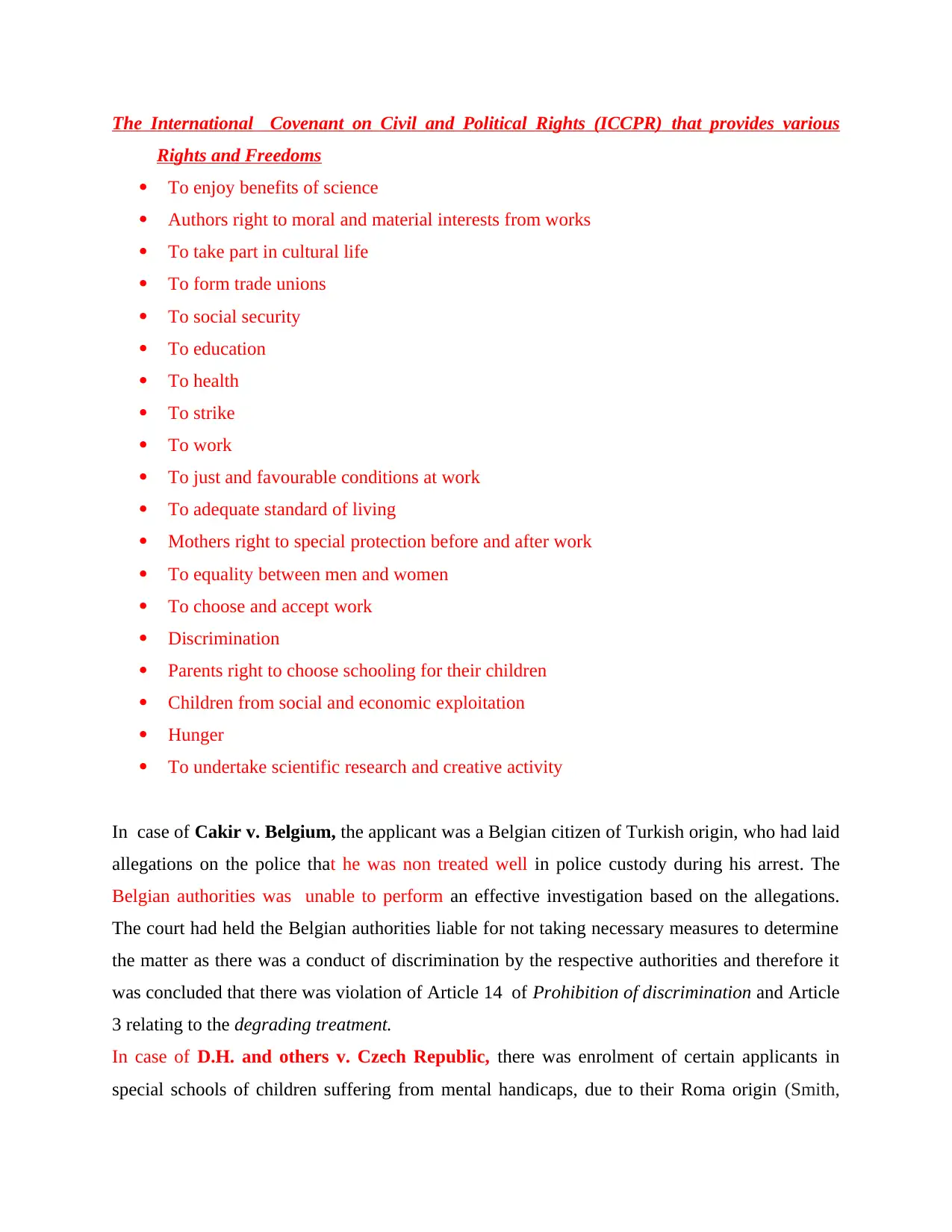
The International Covenant on Civil and Political Rights (ICCPR) that provides various
Rights and Freedoms
To enjoy benefits of science
Authors right to moral and material interests from works
To take part in cultural life
To form trade unions
To social security
To education
To health
To strike
To work
To just and favourable conditions at work
To adequate standard of living
Mothers right to special protection before and after work
To equality between men and women
To choose and accept work
Discrimination
Parents right to choose schooling for their children
Children from social and economic exploitation
Hunger
To undertake scientific research and creative activity
In case of Cakir v. Belgium, the applicant was a Belgian citizen of Turkish origin, who had laid
allegations on the police that he was non treated well in police custody during his arrest. The
Belgian authorities was unable to perform an effective investigation based on the allegations.
The court had held the Belgian authorities liable for not taking necessary measures to determine
the matter as there was a conduct of discrimination by the respective authorities and therefore it
was concluded that there was violation of Article 14 of Prohibition of discrimination and Article
3 relating to the degrading treatment.
In case of D.H. and others v. Czech Republic, there was enrolment of certain applicants in
special schools of children suffering from mental handicaps, due to their Roma origin (Smith,
Rights and Freedoms
To enjoy benefits of science
Authors right to moral and material interests from works
To take part in cultural life
To form trade unions
To social security
To education
To health
To strike
To work
To just and favourable conditions at work
To adequate standard of living
Mothers right to special protection before and after work
To equality between men and women
To choose and accept work
Discrimination
Parents right to choose schooling for their children
Children from social and economic exploitation
Hunger
To undertake scientific research and creative activity
In case of Cakir v. Belgium, the applicant was a Belgian citizen of Turkish origin, who had laid
allegations on the police that he was non treated well in police custody during his arrest. The
Belgian authorities was unable to perform an effective investigation based on the allegations.
The court had held the Belgian authorities liable for not taking necessary measures to determine
the matter as there was a conduct of discrimination by the respective authorities and therefore it
was concluded that there was violation of Article 14 of Prohibition of discrimination and Article
3 relating to the degrading treatment.
In case of D.H. and others v. Czech Republic, there was enrolment of certain applicants in
special schools of children suffering from mental handicaps, due to their Roma origin (Smith,
Paraphrase This Document
Need a fresh take? Get an instant paraphrase of this document with our AI Paraphraser
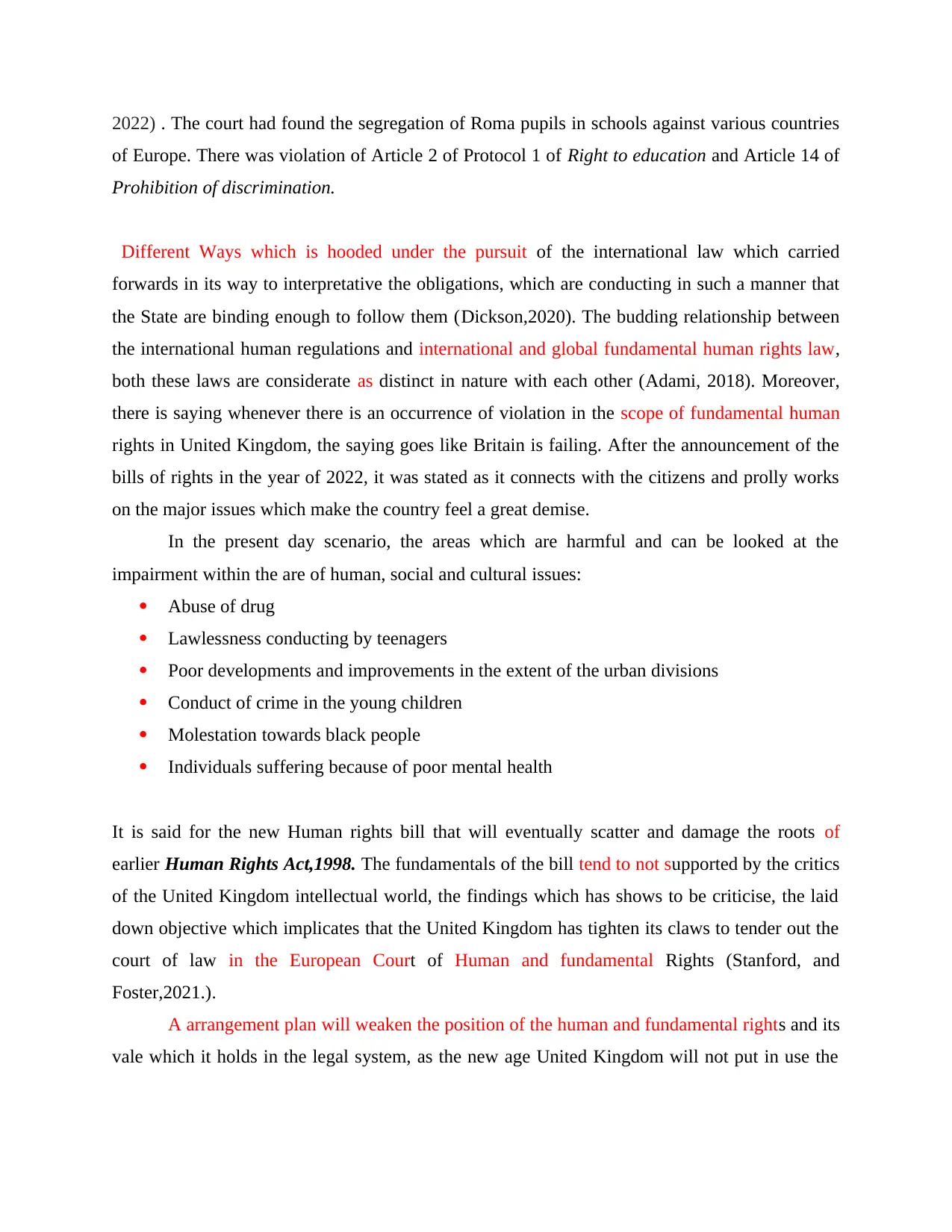
2022) . The court had found the segregation of Roma pupils in schools against various countries
of Europe. There was violation of Article 2 of Protocol 1 of Right to education and Article 14 of
Prohibition of discrimination.
Different Ways which is hooded under the pursuit of the international law which carried
forwards in its way to interpretative the obligations, which are conducting in such a manner that
the State are binding enough to follow them (Dickson,2020). The budding relationship between
the international human regulations and international and global fundamental human rights law,
both these laws are considerate as distinct in nature with each other (Adami, 2018). Moreover,
there is saying whenever there is an occurrence of violation in the scope of fundamental human
rights in United Kingdom, the saying goes like Britain is failing. After the announcement of the
bills of rights in the year of 2022, it was stated as it connects with the citizens and prolly works
on the major issues which make the country feel a great demise.
In the present day scenario, the areas which are harmful and can be looked at the
impairment within the are of human, social and cultural issues:
Abuse of drug
Lawlessness conducting by teenagers
Poor developments and improvements in the extent of the urban divisions
Conduct of crime in the young children
Molestation towards black people
Individuals suffering because of poor mental health
It is said for the new Human rights bill that will eventually scatter and damage the roots of
earlier Human Rights Act,1998. The fundamentals of the bill tend to not supported by the critics
of the United Kingdom intellectual world, the findings which has shows to be criticise, the laid
down objective which implicates that the United Kingdom has tighten its claws to tender out the
court of law in the European Court of Human and fundamental Rights (Stanford, and
Foster,2021.).
A arrangement plan will weaken the position of the human and fundamental rights and its
vale which it holds in the legal system, as the new age United Kingdom will not put in use the
of Europe. There was violation of Article 2 of Protocol 1 of Right to education and Article 14 of
Prohibition of discrimination.
Different Ways which is hooded under the pursuit of the international law which carried
forwards in its way to interpretative the obligations, which are conducting in such a manner that
the State are binding enough to follow them (Dickson,2020). The budding relationship between
the international human regulations and international and global fundamental human rights law,
both these laws are considerate as distinct in nature with each other (Adami, 2018). Moreover,
there is saying whenever there is an occurrence of violation in the scope of fundamental human
rights in United Kingdom, the saying goes like Britain is failing. After the announcement of the
bills of rights in the year of 2022, it was stated as it connects with the citizens and prolly works
on the major issues which make the country feel a great demise.
In the present day scenario, the areas which are harmful and can be looked at the
impairment within the are of human, social and cultural issues:
Abuse of drug
Lawlessness conducting by teenagers
Poor developments and improvements in the extent of the urban divisions
Conduct of crime in the young children
Molestation towards black people
Individuals suffering because of poor mental health
It is said for the new Human rights bill that will eventually scatter and damage the roots of
earlier Human Rights Act,1998. The fundamentals of the bill tend to not supported by the critics
of the United Kingdom intellectual world, the findings which has shows to be criticise, the laid
down objective which implicates that the United Kingdom has tighten its claws to tender out the
court of law in the European Court of Human and fundamental Rights (Stanford, and
Foster,2021.).
A arrangement plan will weaken the position of the human and fundamental rights and its
vale which it holds in the legal system, as the new age United Kingdom will not put in use the
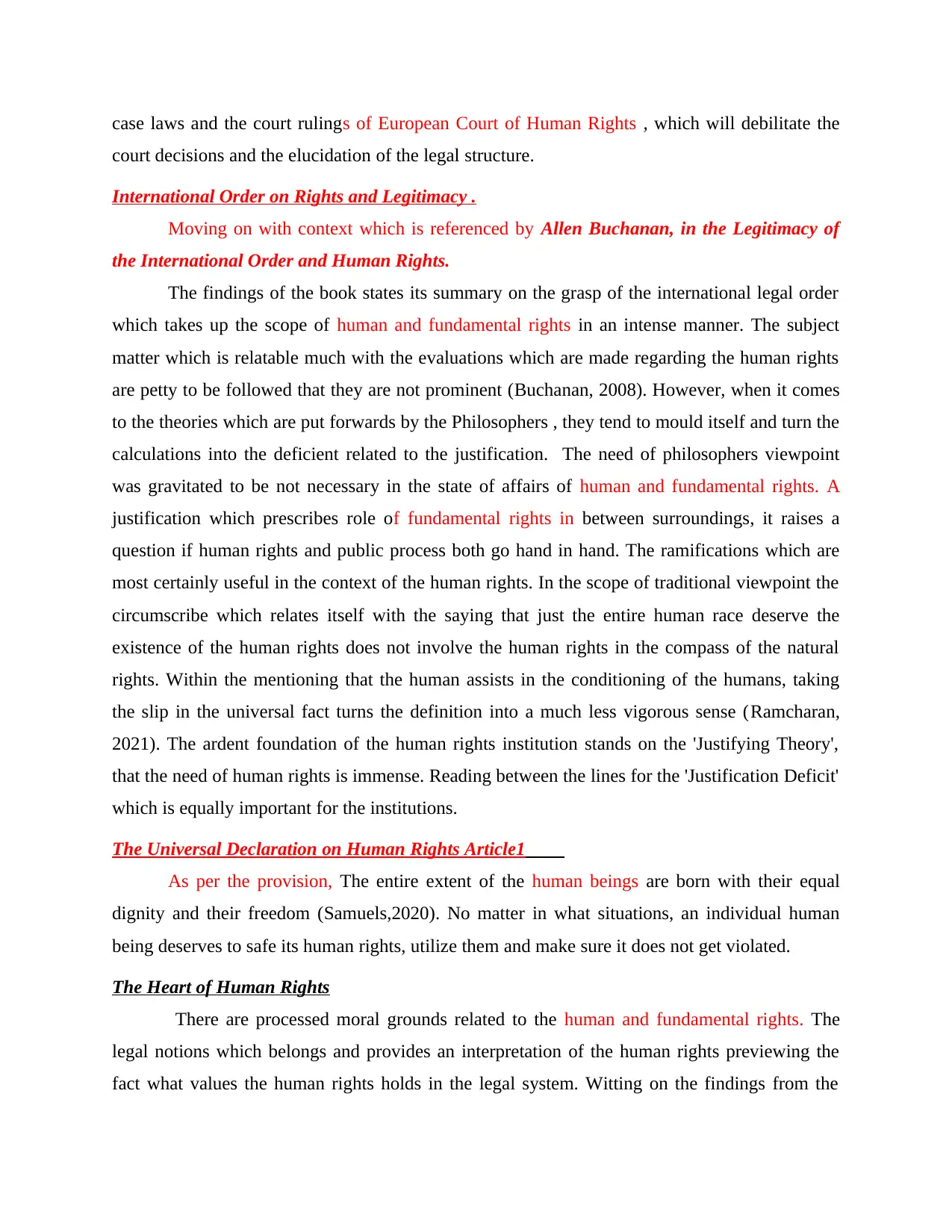
case laws and the court rulings of European Court of Human Rights , which will debilitate the
court decisions and the elucidation of the legal structure.
International Order on Rights and Legitimacy .
Moving on with context which is referenced by Allen Buchanan, in the Legitimacy of
the International Order and Human Rights.
The findings of the book states its summary on the grasp of the international legal order
which takes up the scope of human and fundamental rights in an intense manner. The subject
matter which is relatable much with the evaluations which are made regarding the human rights
are petty to be followed that they are not prominent (Buchanan, 2008). However, when it comes
to the theories which are put forwards by the Philosophers , they tend to mould itself and turn the
calculations into the deficient related to the justification. The need of philosophers viewpoint
was gravitated to be not necessary in the state of affairs of human and fundamental rights. A
justification which prescribes role of fundamental rights in between surroundings, it raises a
question if human rights and public process both go hand in hand. The ramifications which are
most certainly useful in the context of the human rights. In the scope of traditional viewpoint the
circumscribe which relates itself with the saying that just the entire human race deserve the
existence of the human rights does not involve the human rights in the compass of the natural
rights. Within the mentioning that the human assists in the conditioning of the humans, taking
the slip in the universal fact turns the definition into a much less vigorous sense (Ramcharan,
2021). The ardent foundation of the human rights institution stands on the 'Justifying Theory',
that the need of human rights is immense. Reading between the lines for the 'Justification Deficit'
which is equally important for the institutions.
The Universal Declaration on Human Rights Article1
As per the provision, The entire extent of the human beings are born with their equal
dignity and their freedom (Samuels,2020). No matter in what situations, an individual human
being deserves to safe its human rights, utilize them and make sure it does not get violated.
The Heart of Human Rights
There are processed moral grounds related to the human and fundamental rights. The
legal notions which belongs and provides an interpretation of the human rights previewing the
fact what values the human rights holds in the legal system. Witting on the findings from the
court decisions and the elucidation of the legal structure.
International Order on Rights and Legitimacy .
Moving on with context which is referenced by Allen Buchanan, in the Legitimacy of
the International Order and Human Rights.
The findings of the book states its summary on the grasp of the international legal order
which takes up the scope of human and fundamental rights in an intense manner. The subject
matter which is relatable much with the evaluations which are made regarding the human rights
are petty to be followed that they are not prominent (Buchanan, 2008). However, when it comes
to the theories which are put forwards by the Philosophers , they tend to mould itself and turn the
calculations into the deficient related to the justification. The need of philosophers viewpoint
was gravitated to be not necessary in the state of affairs of human and fundamental rights. A
justification which prescribes role of fundamental rights in between surroundings, it raises a
question if human rights and public process both go hand in hand. The ramifications which are
most certainly useful in the context of the human rights. In the scope of traditional viewpoint the
circumscribe which relates itself with the saying that just the entire human race deserve the
existence of the human rights does not involve the human rights in the compass of the natural
rights. Within the mentioning that the human assists in the conditioning of the humans, taking
the slip in the universal fact turns the definition into a much less vigorous sense (Ramcharan,
2021). The ardent foundation of the human rights institution stands on the 'Justifying Theory',
that the need of human rights is immense. Reading between the lines for the 'Justification Deficit'
which is equally important for the institutions.
The Universal Declaration on Human Rights Article1
As per the provision, The entire extent of the human beings are born with their equal
dignity and their freedom (Samuels,2020). No matter in what situations, an individual human
being deserves to safe its human rights, utilize them and make sure it does not get violated.
The Heart of Human Rights
There are processed moral grounds related to the human and fundamental rights. The
legal notions which belongs and provides an interpretation of the human rights previewing the
fact what values the human rights holds in the legal system. Witting on the findings from the
⊘ This is a preview!⊘
Do you want full access?
Subscribe today to unlock all pages.

Trusted by 1+ million students worldwide
1 out of 15
Related Documents
Your All-in-One AI-Powered Toolkit for Academic Success.
+13062052269
info@desklib.com
Available 24*7 on WhatsApp / Email
![[object Object]](/_next/static/media/star-bottom.7253800d.svg)
Unlock your academic potential
Copyright © 2020–2026 A2Z Services. All Rights Reserved. Developed and managed by ZUCOL.





